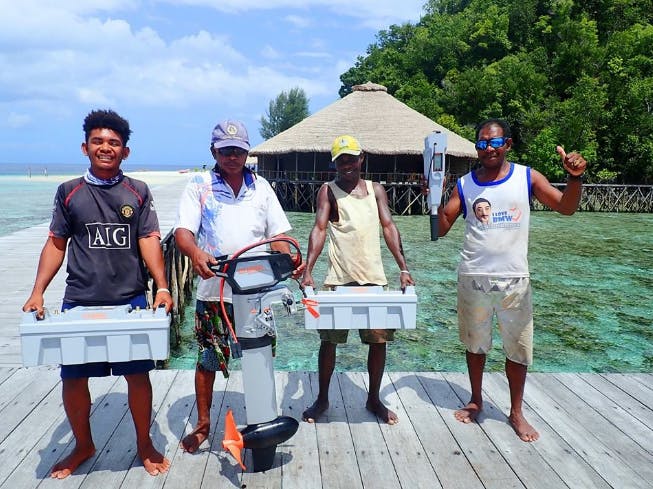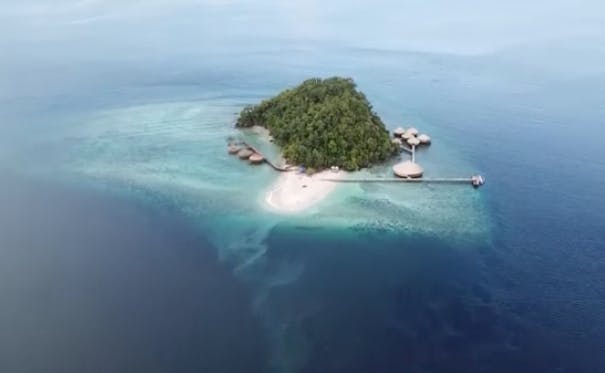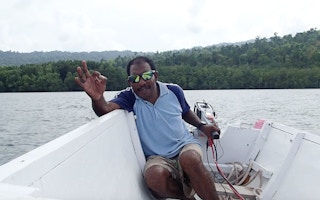Competition is healthy among the eco resorts of Indonesia’s most famous dive destination, Raja Ampat. And MahaRaja Eco Dive Lodge, which only opened 8 months ago, has just scored an important claim to fame.
To continue reading, subscribe to Eco‑Business.
There's something for everyone. We offer a range of subscription plans.
- Access our stories and receive our Insights Weekly newsletter with the free EB Member plan.
- Unlock unlimited access to our content and archive with EB Circle.
- Publish your content with EB Premium.
The small luxury resort is the first in Raja Ampat—and possibly the first in Indonesia—to electrify its dive boats.
MahaRaja has fitted two traditional Papuan long boats with electric engines, beating rival sustainability-minded dive resorts such as Kri Eco Resort, which also has plans to build e-boats, to launch vessels that don’t pollute.
“We are the first [resort] to launch e-boats, and we sincerely hope the others will follow,” MahaRaja’s founder Mahasti Motazedi, a French former aeronautics engineer and Microsoft sales executive, tells Eco-Business.
With tourism growing rapidly Raja Ampat—although remote and expensive, visitor numbers have grown by 1,300 per cent in under a decade—the region’s reefs, the world’s most biodiverse, will hope she’s right.

MahaRaja staff with e-boat gear. Image: MahaRaja
The tourism boom promises opportunities for the indigenous people of Raja Ampat, but West Papuans have not enjoyed an equal share in the economic growth of the region. Motazedi’s aim, like many eco operators in Raja Ampat, is to involve Papuans in her plans. She is training locals to drive, maintain and repair the e-boats, and spread the e-boat gospel among a local community that is accustomed to driving fossil fuel-powered vessels.
Further down the line, MahaRaja plans to donate e-boats to local villages to use to ferry children to school and the sick to healthcare centres.
“
We are the first to launch e-boats, and we sincerely hope the others will follow.
Mahasti Motazedi, founder, MahaRaja Eco Dive Lodge
But there is a fly in the ointment of MahaRaja’s good news—the boats are not entirely green, as their batteries are charged by diesel generators. But Motazedi says a plan is in the works to charge the boats using solar energy, which is used to power most of the resort.
“We have already calculated and architectured the solar system to charge the boat batteries. It will serve more than our own batteries, because we want to become the battery charging station for all the electric boats in Batanta,” she says.
People will use her lodge’s battery charging system “like a petrol station”, she says, paying a small fee to get fuelled with power from the sun. The only thing stopping her from setting this up now is funding, which she is currently trying to secure.

MahaRaja Eco Dive Lodge from above: Image: MahaRaja
Next to get hooked up to the lodge’s solar system are the dive compressors, the only other part of the resort that is powered by diesel generators.
“Once our compressors run on our solar system, our diving will be 100 per cent green and sustainable. We will be the first to do this—and not only in Raja Ampat or Indonesia,” she says.
The boats are equipped with electric engines made by German electric outboard motor manufacturer Torqeedo. One 22-metre boat that can carry 12 people is fitted with a Torqeedo Cruise 4.0 engine. This engine can run for 2 hours with a range of 20km. The other, an 8-metre boat for 6 people, has a Torqeedo Travel 1003 engine which can run for 1 hour and with a range of 10km.
E-boats give the more environmentally conscious divers a cleaner conscience, because they’re not polluting the water or air. And they’re quieter too, so are less likely to disturb marine life.
“You can still hear the propellor turning in the water behind the boat, it’s not completely silent like an electric car,” Motazedi. “But it creates a much nicer environment for divers and marine life.”

















